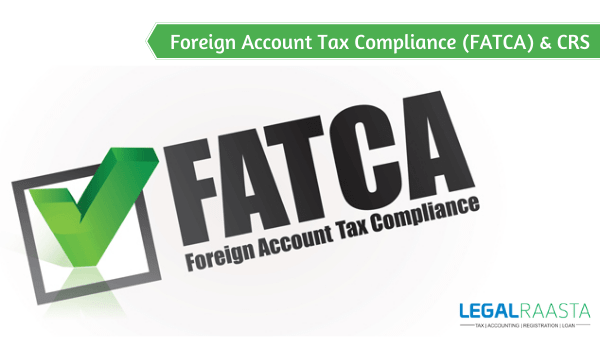What is FATCA?
Contents
- What is FATCA?
- A Detailed Overview Of Foreign Account Tax Compliance Act
- What Is The Difference Between Foreign Account Tax Compliance Act and CRS
- Foreign Account Tax Compliance Act
- US-India agreement to implement FATCA
- FATCA declaration for NRIs
- Common Reporting Standard (CRS)
- CRS Declaration
- Documents for FATCA & CRS declarations
- To whom does FATCA apply?
- Investments and FATCA application
- NRI Owned Housing Properties
- Bank accounts
- Not covered by FATCA
- Non-compliance repercussions
Foreign Account Tax Compliance Act is better known as FATCA is a tax law created by the US government in 2010 as part of the Hiring Incentive to Restore Employment (HIRE) Act.
The Act needs specific international financial institutions to submit details of financial accounts held by US taxpayers to the Internal Revenue Service (IRS). These institutions need to submit instances of tax evasion too. A financial institution is given the power to withhold tax if a person does not comply with any document perquisites.
In short, the goal of FATCA is to increase transparency and curb evasion of taxes by keeping an eye on the income earned by NRIs living in the USA from their non-US investments and assets.
A Detailed Overview Of Foreign Account Tax Compliance Act
The HIRE (Hiring Incentives to Restore Employment) Act was launched law by President Barack Obama in 2010 to incentivize businesses to hire unemployed workers to decrease the high unemployment rate that was created by the 2008 financial crisis.
One of the benefits offered to employers through the HIRE Act includes an increment in business tax credit for all the new employees hired and maintained for at least 52 weeks. Other benefits include payroll tax holiday incentives and increment in a firm’s expense deduction limit for new equipment bought in 2010.
To finance the costs of these benefits, revenue-generating provisions in the HIRE Act through FATCA were included by Congress. Foreign Account Tax Compliance Act regulations need all U.S. taxpayers to submit the report annually of all assets that they hold outside of that particular country. By taxing these assets held in foreign, the U.S. increased its revenue stream, which funds its incentives account for job stimulation. Penal provisions are levied on U.S. residents who do not submit their foreign account holdings report and assets that are more than $50,000 in value in any given year.
Foreign financial institutions (FFI) that are not in the US and non-financial foreign entities (NFFE) also need to comply with this law by disclosing the identities of U.S. citizens and the number of their assets held in their banks to the Internal Revenue Service (IRS) or the Foreign Account Tax Compliance Act Inter-governmental Agreement (IGA). Foreign Financial Institutions that do not comply with the IRS will not be included in the U.S. market as well as have 30% of the amount of any due payment deducted and taken from them as a tax penalty.
Due payments in this situation mean income gained from U.S. financial assets that are being held by these banks and some of these assets are dividends, interests, remunerations, salaries and wages, compensations, periodic gains, etc.
NFFEs and FFIs that comply with the law must report the name, address, and tax identification number (TIN) of each account holder that meets the criterion of a U.S. citizen, the account number, the account balance, and any deposits and withdrawals on the account for the year annually.
Just like the price to pay for not complying with FATCA is high, the costs for compliance are also high. Barclay’s, TD Bank, and Credit Suisse spent millions of dollars, as per a report, in fighting this law because they faced compliance costs of around $100 million.
Large banks such as HSBC, and Deutsche, which follow the imposition of the law, either limited the services offered to Americans or stopped serving U.S. investors to transfer the high compliance cost entirely.
This is all the information that you need to have about FATCA, though these details are subject to change so be sure to contact experts before taking any big decision regarding this information.
What Is The Difference Between Foreign Account Tax Compliance Act and CRS
The requirement of the system that validates and improves tax compliance globally has led to the creation of FATCA and CRS. Before we talk about FATCA and CRS compliance, let us talk about the difference between the both of them below:
FATCA
The US Tax Department introduced FATCA in the year 2010 to encourage tax compliance and avoid tax evasion. FACTA is abbreviated from of Foreign Account Tax Compliance Act.
CRS
While CRS is basically a more international version of FATCA. While FATCA is made for US persons only, the CRS is applied to citizens of every registered country.
FATCA requires the assistance of a financial institution to find US people
On the other hand, CRS has 90 countries (except the US) committed to it and it has a way larger scope.
Under FATCA, it is not necessary to report on financial accounts all the time.
Giving a report of your financial accounts is necessary under CRS.
The account of an individual should have a balance more than $50,000 under FATCA
While there is no minimum limit under CRS
The number of US people that report under Foreign Account Tax Compliance Act is only a few thousands
On the other hand, millions of people submit reports under CRS.
Hence, both FATCA and CRS don’t let offshore investors avoid taxes and hoard unaccounted cash overseas. Though, cooperation from the tax authorities from all the registered G20 and OECD countries is needed. At last, the Common Reporting Standard or CRS was launched.
Foreign Account Tax Compliance Act
FATCA was introduced to fight tax evasion and to make sure of strict adherence to tax rules. Its main aim is to find and prevent offshore tax evasion by US citizens or residents.
In short, it is an endeavor to identify US persons gaining profit from offshore investments and stash assets in other countries.
FATCA lets financial authorities withhold tax if US persons fail to meet the documentation perquisites. For this, all financial institutions that have been registered under this Act should quickly notify the US tax department when they find US persons that try to evade tax.
Consequently, all registered banks report such account holders (with the relevant information) immediately. FATCA has a big impact on US multinational companies and individuals and Foreign Financial Institutions.
US-India agreement to implement FATCA
FATCA makes sure about the tax compliance and transformation at a universal level. It provides foreign financial institutions a way to better and streamline their tax reporting process. It also provides visibility to them in a foreign country and earns the trust of investors.
To assist FATCA, the government had imposed Rules 114F to 114H and Form 61B in the Income Tax Act in 2014. The Indian Government also got registered under the Inter-Governmental Agreement (IGA) with the United States of America in 2015 for the implementation of the Foreign Account Tax Compliance Act. As per the agreement, Indian tax officials need to obtain specific account details from US investors.
The objective was to make sure of tax compliance by the US citizens, while at the same time improving transparency for their Internal Revenue Service (IRS). This provided a corporate basis for the Reporting Financial Institutions to maintain and submit personal and income details.
FATCA declaration for NRIs
From January 2016 it has been made effective, that it’s necessary for all Indian and NRI investors (existing and new) to submit a FATCA self-declaration. The information might be a little different depending on the particular financial institution, the basic information they mandate are:
- Name
- PAN (Permanent Account Number)
- Address
- City or State (Place) of birth
- Country where the individual was born
- Nationality
- GAI (Gross Annual Income)
- Occupation
- If the resident is of another country then the country of residence, Tax ID number, and type will be required.
The announcement wants specifically to include the USA as a country of residence if you are a US citizen or a green cardholder. This is true even if you have migrated to India and are now a resident of India. Moreover, this declaration states that the Central Board of Direct Taxes (CBDT) has already got this covered in the rules 114F-114H. Hence, the tax authorities will be given access to all required information. Just in case, please go the respective financial institution within 30 days in case of any change in the information stated above.
Common Reporting Standard (CRS)
The Organisation for Economic Cooperation and Development (OECD) created the Common Reporting Standard (CRS) to regulate Automatic Exchange of Information (AEoI). CRS makes it necessary for financial institutions across countries to give respective tax authorities information about their citizens and their wealth in other countries. This can help governments while getting details about the financial assets that its citizens hold internationally – for tax reasons. Until now, more than 90 countries have registered under this global standard. India has signed a multilateral agreement to provide personal and account information of another country’s citizen to their relevant tax authority too. Convention on Mutual Administrative Assistance of Article 6 in Tax Matters mentioned in the CRS rules refers to this.
CRS Declaration
Most of the details that are required as per the CRS self-declaration are similar to that of FATCA. Though CRS covers taxpayers from over 90 countries, as compared to FATCA, which is applied only on the US taxpayers. You can install the CRS self-declaration form through the overseas mutual fund website. If not, you can also go to the fund house service centers or the Asset Management Company (AMC) office. You can report the self-declaration online or offline at any of the fund company branches. For example, Registrar and Transfer Agencies like CAMS provide this service. To finish the registration, you will be needed to fill in the OTP, created using your PAN number. CRS declaration is no less than an extension of the KYC (Know Your Customer) documents.
Documents for FATCA & CRS declarations
All foreign financial institutions in India makes it necessary for US persons to submit the documents mentioned down below:
- Permanent Account Number (PAN) Card
- Passport
- Aadhar Card, Voter ID card, or any other Government-issued ID card
The Government of India will know if the investor is a resident or an NRI based on this declaration. The Central Board of Direct Taxes (CBDT) will make announcements for all NRI investors on the required information. Avoiding of taxes is not a problem unique to one country. So, the solutions must be at a universal level. The focus of CRS is on the global transparency and consistency of compliance in all the registered nations. FATCA and CRS have gone a long way in the process of decreasing tax evasions and non-compliance all around the world in recent years. Hence, US individuals, NRI investors included, should be aware of these regulations, specifically if they want to invest in offshore funds.
To whom does FATCA apply?
As per FATCA, everyone who lives in the USA is subject to this tax law. These include:
- Green card holders or permanent US residents ;
- US citizens or NRIs who have migrated to the US and are now US citizens
- PIO (People Of Indian Origin) or NRIs working in the US through B1/B2, H1-B, E-2, or L1/L2 visa
Let’s take a look at the list of investments and assets to see if they fall under FATCA’s application.
Investments and FATCA application
Indian investments that need to be reported and taxed in the US include fixed deposits, public provident fund, stocks, mutual funds, bank interest, retirement contributions and other capital gains.
NRI Owned Housing Properties
NRIs that own house properties in India do not fall under certified assets of FATCA. The meaning of this is that income earned from them is not subject to FATCA. Though this income is falls under taxation rules of India.
Bank accounts
NRIs that hold accounts like NRE, NRO, and FCNR come under the application of FATCA.
Not covered by FATCA
Assets that are not included under the FATCA rules include antiques, jewelry, cars, art pieces and other collectibles. Safety deposit boxes do not need to be submitted. Foreign currency that you hold but not in any financial institution doesn’t need to be submitted under FATCA.
Non-compliance repercussions
FATCA non-compliance in India can lead to freezing of bank accounts, blockage of mutual fund investments, and blocking of NPS or PPF accounts.
You can visit our website services LegalRaasta.Our specialist team will manage you in every part of connected to ca and cs services. You can download our app which is simple to access in android mobiles LegalRaasta APP. Even you can ring us at 8750008585 and feel free to send your query on Email: [email protected]
Related Article






